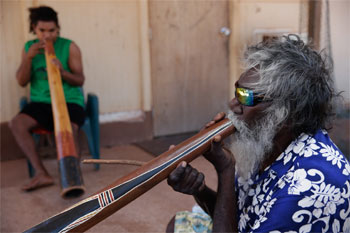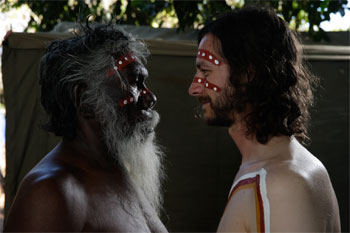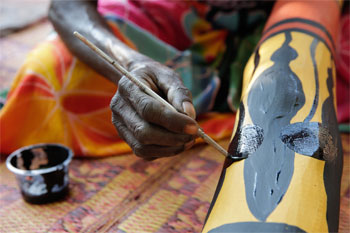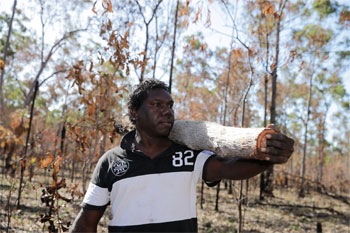Ben Strunin Westwind: Djalu's Legacy

Djalu Gurruwiwi is an Aging Elder
Cast: Gotye
Director: Ben Strunin
Genre: Documentary
Running Time: 86 minutes
Synopsis: Djalu Gurruwiwi, an aging Elder in a line 60,000 years long, is running out of time to pass on the Yidaki Songlines entrusted to him for the future of his people, before they die with him. He is respected and feared in Indigenous circles across 'the top-end', and world famous to people who know and love the Yidaki, aka didgeridoo. Djalu is a wise leader, master craftsman and Yidaki player, and custodian of the ancient Songlines that store all Knowledge, Culture, and Country for his Galpu clan since the birth of time.
But now Djalu faces a dilemma. The act of passing on the Songlines from father to son, which has preserved Yolngu knowledge for countless generations, has broken down. The social and psychological wounds of colonisation, and influence of western culture, are drowning out Djalu's song. His son Larry, the rightful heir to Djalu's Lore, is lost in a world which has no place for the old ways, where nothing but consumerism and inebriation are offered in place of ancestral beliefs. When Djalu's contemporaries begin to die around him, the brightest lights in Yolngu culture cut down by an early death, Djalu takes a revolutionary step to save his Songlines. He applies ancient Yolngu Lore to find a balance with the modern world. For many Yolngu people Djalu's engagement with western culture, and sharing of Songlines is sacrilegious. But for Djalu it reflects the oldest teachings of his "Wititj" aka the Rainbow Serpent Creation stories: the Serpent must move forward in a renewed cycle or it will wither and perish.
Djalu takes a bold step to force the meeting of the two opposites of his world, he travels to Europe for a 'lightning' tour. Djalu knows this trip could show to his sons, and the generations to come that Yolngu culture is respected and celebrated by non-Indigenous people, Balanda. But at the last moment, Larry withdraws from the trip and Djalu is left to travel without him. Far from the shores of Australia he finds the respect and audience that does not exist at home. But on Djalu's return, death and dissolution greet him, and for a long while it seems that the forces of history will frustrate Djalu's sacred duty to save his sons from their aimlessness and pass the Songlines on. Then, just when it seems all is lost, a new kind of son comes to Djalu from the most unlikely place. A famous Balanda, one of the biggest pop stars on Earth hears about Djalu's European trip, and travels to Djalu's home to learn about the Yidaki Songlines. Against the wishes of some in his community Djalu steps outside the normal paradigms of Indigenous tradition, and brings a non-Indigenous man, world famous musician Gotye, into the fold of sacred knowledge. When it seems that Djalu has lost the way or that he could even sell his precious legacy cheaply to outsiders, something happens - lightning strikes and Djalu proves himself as the wise old man that he always was.
Westwind: Djalu's Legacy
Release Date: March 10th, 2018
 About The Production
About The Production
Characters
Djalu Gurruwiwi
At 70 plus years old Djalu was born before clothes were necessary, but as a child experienced the Japanese invasion WW2 firsthand. He life has shifted from the 'Dreamtime' to stages in front of thousands, but as Aunty his sister says, 'We Yolngu we live on a spiritual plane.'
Larrtjanga Larry Gurruwiwi
Djalu's eldest son, quiet and gentle, loves playing football, and making music, he goes from being unwilling, afraid, shy and staying at home when Djalu goes out to do cultural business, to a confident mature musician on stage with Gotye.
Gurruwiwi Family
The most of the time the people who we spend time with will be the gregarious members of family and community. Their individual, wonderful wit and intelligences will fill the screen:
Dholpyia - Djalu's wife
Zelda - Djalu's daughter
Vernon – Djalu's Son
Kevin – Djalu's Grandson
"Aunty" – Djalu's Sister
Gotye
Wally De Backer is a Melbourne boy with his roots in Belgium, is a musical phenomenon, and at the same time extremely generous and grounded person. He is researching sound and music, but finds something else - family.
Barra
Vernon, Andrew, Dion, Adrian, PJ – super talented charismatic having fun, explaining culture, translating it, dancing and performing in front of thousands of people
Monyu
Djalu's father, raised his son on the Wessels Islands, Djalu has dramatic memories of his father having been an imposing and respected leader.
 Director's Statement
Director's StatementThis film began many years ago and has evolved organically into a larger story than I believe neither myself or Djalu ever anticipated.
In 2009 I was introduced to Djalu by a British Didjeridoo collector called Colin Goring. He wanted me to make a documentary about Djalu's European tour and connected me to his tour manager Jeremy Cloake, who later became a cultural advisor on the film. Jeremy explained that as is custom I would be expected to greet Djalu at the airport so he could look me in the eyes before he would consider letting me tell his story. We met at 5am at Heathrow and took a stretched limo to East London whilst Djalu explained he wanted a film made that would inspire the next generation back home a film that would reflect to the Yolngu youth how their culture was revered around the world by millions of Balanda (non-Indigenous people). And so the film began in the most unlikely of places.
Balanda around the world have a thirst for Yolngu knowledge and Djalu's response is to actively bridge the gap between black and white societies, to shine a light on a world that is usually hidden from the outsiders. I've watched him do this with relentless drive over the years, and have been truly inspired.
I was initially fascinated by how Djalu engaged with people all over the world, considering his broken English and often cryptic Wizardly ways of talking, everyone seemed to hang on his every word and gesture. Charmed by his generosity of spirit and willingness to share knowledge and stories, it was a steep, intense learning curve to consider the world from his perspective.
I soon realized Djalu's technique of transmitting understanding to Balanda embraced the power of the songlines and sounds that he delivered through his Yidaki. It's a universal power and musical language that transcends culturally imposed boundaries and speaks to the core of human experience. It was in synergy with my style of filmmaking, I have always endeavored to manifest the powers of music and art to transmit stories, hereby transcending language barriers and specific cultural experience. Consequently, we named the film after the sound known as Westwind or in Yolngu 'Barra' which we felt would resonate with audiences long after they left the cinema.
Whilst watching Transformers 3 with 'Old Man' on his flat screen TV, it became more and more apparent that Djalu is beyond "au fait" with the modern media landscape. It has been an inspiration to work with a man that is the embodiment of an ancient culture yet is so open to new ways. I've always been encouraged by his guidance, yet he gave me the freedom and confidence to explore the complexities of his story and ultimately share it with the world.
Gotye, David Booth and Soren Solkaer all contributed to this film with their own distinctive skillsets and willingness to participate in the journey. Gotye in particular risked a certain kind of scrutiny with his openness and trust in the film project that you would rarely expect from any other celebrity of his stature. I think we all shared the feeling of privilege to be learning from Djalu in his sacred homeland.
Across the board every potential collaborator we approached seemed to instantaneously connect with and understand Djalu's importance and that they could, in their own way, help amplify his story by offering their own unique talent.
Like many before me I was brought into the family fold and my education on Yolngu ways intensified, they showed me the same generosity of spirit and patience as Djalu and never belittled us for our ignorance. Djalu's sister "Aunty" was possibly the greatest of all the teachers; her straight to the point manner, articulate explanations and wicked sense of humor complemented Djalu's more esoteric teachings. I was beginning to understand the years of challenges and hardships the Galpu clan had faced.
It is Aunty who crystallized Djalu's anxieties in dealing with Larry's depression and failure to rise to the task set before him to become a worthy successor. Over time it was Aunty who also helped inspire Larry to come out of his shell, to work more with his dad, and with us the film crew. We would later enjoy the process of refining the story together. The dedicated producers Kate Pappas and Ben Pederick who came to Arnhem Land and were also brought into the family can both testify to Aunty's profound impact on our collective understanding of the Galpu world. If I could change anything, it would be that everyone involved with the film could've shared time with Djalu in his home. I've felt privileged to be surrounded by so many people that believed in this story including Paul Wiegard, Virginia Whitwell, Nick Batzias and Suzanne Walker from Madman and all at Screen Australia, Film Victoria, Melbourne International Film Festival, NITV and Sandrew, crowd funders and the generous support of Ingrid and Tom Beazley. I hope that everyone who watches this film will listen and learn like we did from Aunty and to feel the warmth of her spirit now that she has passed.
I know that through his work and spirit Djalu's voice will carry into the future, and I am happy that this film will help to amplify his intent in the way he first explained to me long ago now, in the back of a limousine. I hope that this film will empower Larry's resolve to carry his father's legacy, as that he knows he has been instrumental in our realization of Djalu's wish to have it made. It's been an incredibly difficult and long journey to get to this point, but we are stronger together for the intense collaboration. I hope the audience will not only be entertained and moved, but that they can understand the tangible connection between our worlds and see that it is possible to work together the way we have.
Ben Strunin- June 2017
 Reflections from Leila Gurruwiwi
Reflections from Leila GurruwiwiI believe there are many untold stories in Australia that need to be told and this is definitely one of them. As a Yolngu woman and being a part of the Galpu clan, this story sits very close to my heart. The importance of acknowledging the amazing knowledge that our old people have to share is integral to keeping our culture and lore strong for generations to come. It is also about understanding that culture is something we should share with those who want to know more, who want to understand more whether they are Yolngu or not.
Djalu is my mari (through our kinship system I call him Granddad) and is probably not acknowledged as much as he should be in the community.
Connecting with him and my late mari (Miss Gurruwiwi) made my connection to my father's Galpu clan stronger and in turn made me stronger in my identity as a Yolngu woman.
This is a story of keeping culture and lore strong but also the struggle that comes with trying to balance cultural responsibilities and living in a western world, something I am fully aware of.
I hope you get as much out of this movie as I have and that it will want to make you want to know more, learn more, explore more of the amazing culture that is still living and strong here in Australia.
Leila Gurruwiwi- June 2017
Westwind: Djalu's Legacy
Release Date: March 10th, 2018
MORE
- Mission: Impossible Fallout
- Glenn Close The Wife
- Allison Chhorn Stanley's Mouth Interview
- Benicio Del Toro Sicario: Day of the Soldado
- Dame Judi Dench Tea With The Dames
- Sandra Bullock Ocean's 8
- Chris Pratt Jurassic World: Fallen Kingdom
- Claudia Sangiorgi Dalimore and Michelle Grace...
- Rachel McAdams Disobedience Interview
- Sebastián Lelio and Alessandro Nivola...
- Perri Cummings Trench Interview



